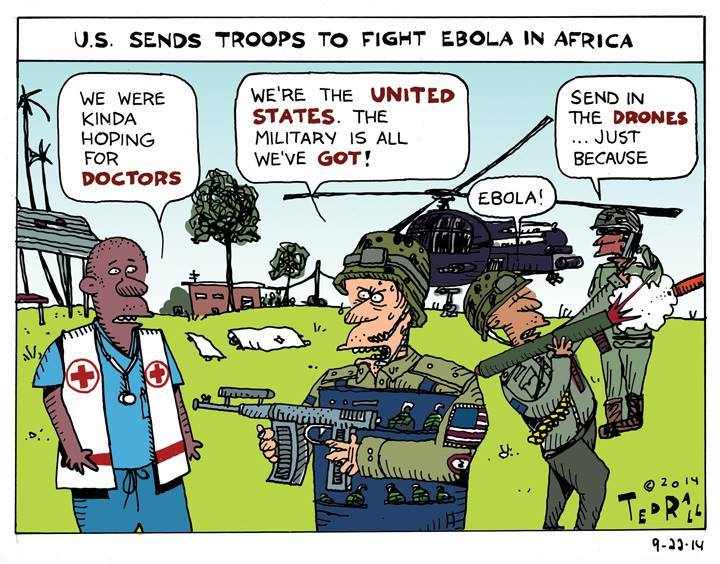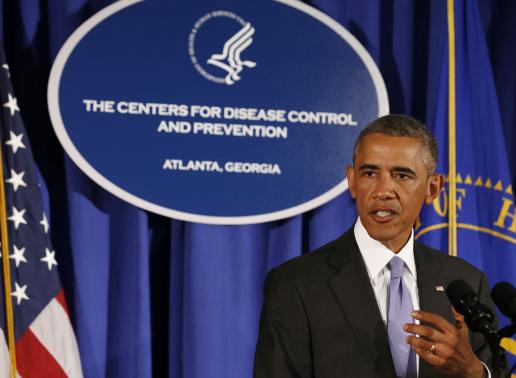US to Deploy 3000 Troops to Ebola Crisis Areas
AFRICA, 13 Oct 2014
Jeff Mason and James Harding Giahyue, Reuters – TRANSCEND Media Service
 President Barack Obama called West Africa’s deadly Ebola outbreak a looming threat to global security and announced a major expansion of the U.S. role in trying to halt its spread, including deployment of 3,000 troops to the region.
President Barack Obama called West Africa’s deadly Ebola outbreak a looming threat to global security and announced a major expansion of the U.S. role in trying to halt its spread, including deployment of 3,000 troops to the region.
“The reality is that this epidemic is going to get worse before it gets better,” Obama said at the Atlanta headquarters of the U.S. Centers for Disease Control and Prevention (CDC).
“But, right now, the world still has an opportunity to save countless lives. Right now, the world has the responsibility to act, to step up and to do more. The United States of America intends to do more,” he added.
The U.S. plan, a dramatic expansion of Washington’s initial response last week, won praise from the U.N. World Health Organization, aid workers and officials in West Africa. Experts said it was still not enough to contain the epidemic, which is rapidly spreading and has caused already-weak local public health systems to buckle under the strain of fighting it.
U.S. officials said the focus of the military deployment would be Liberia, a nation founded by freed American slaves that is the hardest hit of the countries affected by the crisis.
Obama’s plan calls for sending 3,000 troops, including engineers and medical personnel; establishing a regional command and control center in Liberia’s capital, Monrovia, commanded by Major General Darryl Williams, who arrived there on Tuesday; and forming a staging area in Senegal to help distribute personnel and aid on the ground.
It also calls for building 17 treatment centers with 100 beds each; placing U.S. Public Health Service personnel in new field hospitals in Liberia; training thousands of healthcare workers for six months or longer; and creating an “air bridge” to get health workers and medical supplies into West Africa more quickly.

U.S. President Barack Obama speaks at the Centers for Disease Control and Prevention in Atlanta, Georgia, September 16, 2014.
Credit: Reuters/Larry Downing
The worst Ebola outbreak since the disease was identified in 1976 has already killed nearly 2,500 people and is threatening to spread elsewhere in Africa.
Obama said “the world is looking to us” to take the lead against Ebola, but urged other nations also to take action because the epidemic is “spiraling out of control” and “people are literally dying in the streets.”
The White House said the troops will not be responsible for direct patient care. Amid concern about infections, Obama said the “safety of our personnel will remain a top priority.” He also said the “chances of an Ebola outbreak here in the United States are extremely low.”
GLOBAL SECURITY
Obama said that if the outbreak is not stopped now, hundreds of thousands of people may become infected, “with profound political and economic and security implications for all of us.”
“This is an epidemic that is not just a threat to regional security. It’s a potential threat to global security, if these countries break down, if their economies break down, if people panic. That has profound effects on all of us, even if we are not directly contracting the disease,” Obama added.
The WHO praised the U.S. plan for providing support to the United Nations and other international partners to help authorities in Guinea, Liberia, Sierra Leone, Nigeria and Senegal contain the outbreak.
“This massive ramp-up of support from the United States is precisely the kind of transformational change we need to get a grip on the outbreak and begin to turn it around,” Dr. Margaret Chan, WHO’s director-general, said in a statement.
Earlier, a senior WHO official said the Ebola outbreak requires a much faster response to limit its spread to tens of thousands of cases.
“We don’t know where the numbers are going on this,” WHO Assistant Director-General Bruce Aylward told a news conference in Geneva, calling the crisis “unparalleled in modern times.”
The initial U.S. response last week had focused on providing funding and supplies, drawing criticism from aid workers for not deploying manpower as in other disasters like earthquakes.
Obama’s announcement marks his second within a week of a new mission for the U.S. military, following last week’s speech outlining a broad escalation of the campaign against the Islamic State militant group in Iraq and Syria.
During a congressional hearing in Washington, CDC official Beth Bell said the “window of opportunity” to control Ebola’s spread is closing, while both Democratic and Republican lawmakers voiced support for funding the fight against the virus.
“We need to declare a war on Ebola,” Republican Senator Jerry Moran said.
‘WELCOME NEWS’
Liberians hailed the word that U.S. troops were coming, recalling a military operation in 2003 that helped stabilize the country during a civil war.
“This is welcome news. This is what we expected from the U.S. a long time ago,” Anthony Mulbah, a student at the University of Monrovia, said in the dilapidated oceanfront capital. “The U.S. remains a strong partner to Liberia.”
In Liberia, a shortage of space in clinics for isolating victims means patients are being turned away, then infecting others.
Ebola spreads rapidly, causes fever and uncontrolled bleeding.
The virus has so far killed 2,461 people, half of the 4,985 people infected, and the death toll has doubled in the past month, WHO’s Aylward said.
The outbreak was first confirmed in the remote forests of southeastern Guinea in March, then spread across Sierra Leone and Liberia. A handful of Ebola deaths have been recorded in Nigeria, Africa’s most populous country.
The disease has crippled weak health systems, infecting hundreds of local staff in a region chronically short of doctors. The WHO has said that 500 to 600 more foreign experts and at least 10,000 more local health workers are needed.
“It is not enough to provide protective clothing when you don’t have the people who will wear them,” Ghana’s President John Dramani Mahama said during a visit to Sierra Leone.
The U.S. intervention comes as the pace of cash and emergency supplies dispatched to the region accelerates.
Before Tuesday, Washington had sent about 100 health officials and committed some $175 million in aid. Other nations, including Cuba, China, France and Britain; have pledged medical workers, health centers and other forms of support.
Critics, including regional leaders, former U.N. Secretary-General Kofi Annan and Peter Piot, one of the scientists who discovered Ebola in 1976; have said international efforts so far have fallen woefully short.
“It is now up to other governments to equally scale up their support in Sierra Leone and Guinea,” Piot, now director of the London School of Hygiene and Tropical Medicine, told Reuters.
Many neighboring African countries have closed their borders and canceled flights to affected countries, making the humanitarian response more difficult.
A draft U.N. Security Council resolution on Ebola, obtained by Reuters, calls on U.N. member states, particularly in the region, to lift general travel and border restrictions. The resolution could win approval later this week.
______________________________
Additional reporting by Tom Miles and Stephanie Nebehay in Geneva, Umaru Fofana in Freetown, Alphonso Toweh, David Lewis in Dakar, Sharon Begley in New York and Roberta Rampton and Susan Heavey in Washington.
Writing by Will Dunham.
Editing by Daniel Flynn, Peter Graff and Jonathan Oatis.
DISCLAIMER: The statements, views and opinions expressed in pieces republished here are solely those of the authors and do not necessarily represent those of TMS. In accordance with title 17 U.S.C. section 107, this material is distributed without profit to those who have expressed a prior interest in receiving the included information for research and educational purposes. TMS has no affiliation whatsoever with the originator of this article nor is TMS endorsed or sponsored by the originator. “GO TO ORIGINAL” links are provided as a convenience to our readers and allow for verification of authenticity. However, as originating pages are often updated by their originating host sites, the versions posted may not match the versions our readers view when clicking the “GO TO ORIGINAL” links. This site contains copyrighted material the use of which has not always been specifically authorized by the copyright owner. We are making such material available in our efforts to advance understanding of environmental, political, human rights, economic, democracy, scientific, and social justice issues, etc. We believe this constitutes a ‘fair use’ of any such copyrighted material as provided for in section 107 of the US Copyright Law. In accordance with Title 17 U.S.C. Section 107, the material on this site is distributed without profit to those who have expressed a prior interest in receiving the included information for research and educational purposes. For more information go to: http://www.law.cornell.edu/uscode/17/107.shtml. If you wish to use copyrighted material from this site for purposes of your own that go beyond ‘fair use’, you must obtain permission from the copyright owner.